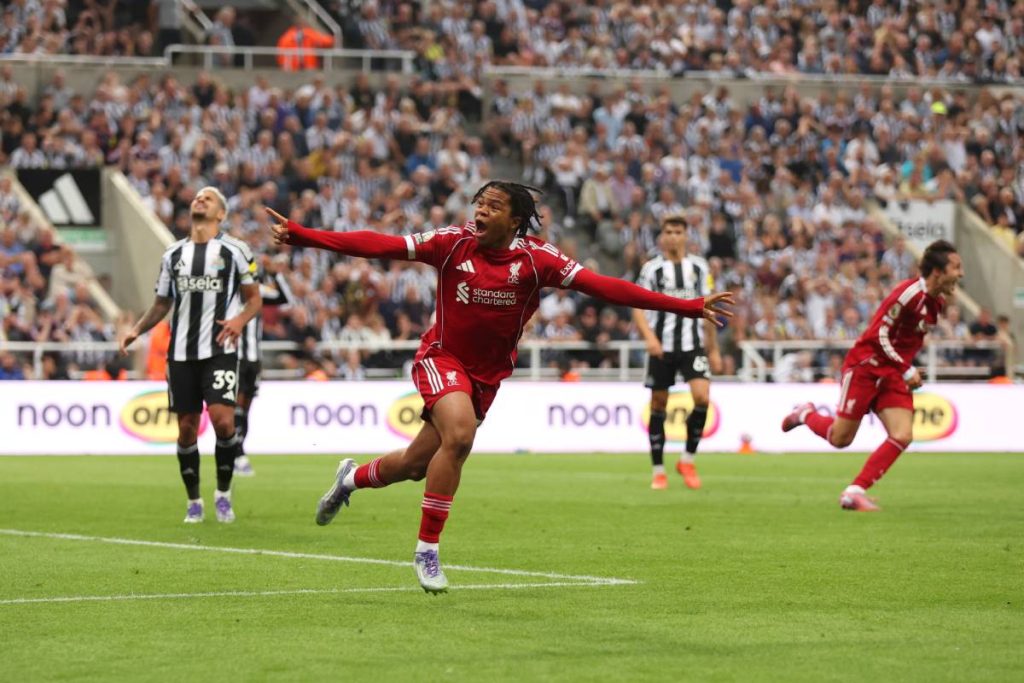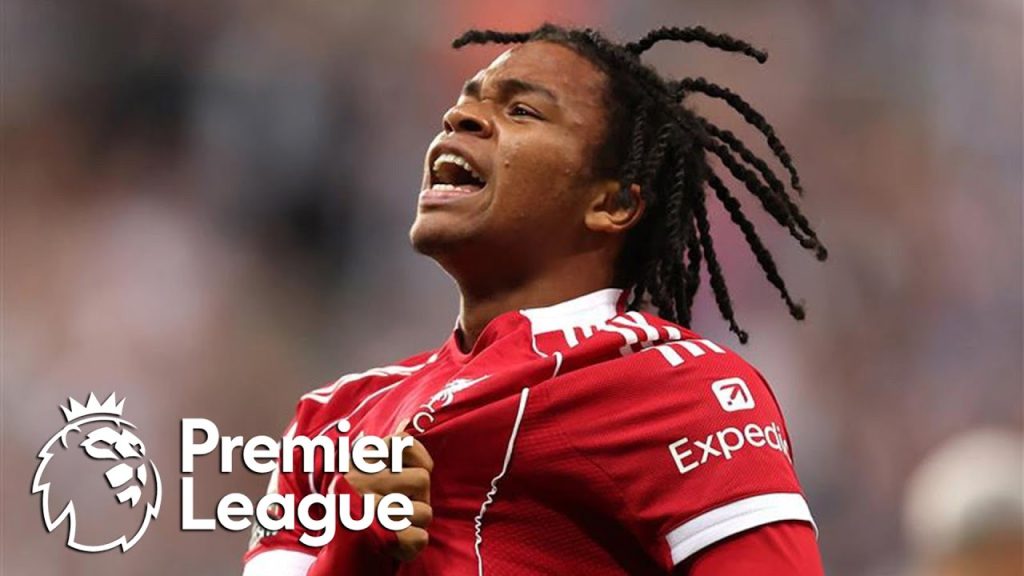Introduction
The Premier League has long been a battlefield where rivalries are not just played out on the pitch, but also in chelsea boardrooms, academies, and transfer negotiations. In 2025, one of the most talked-about stories revolves around Chelsea and Liverpool, two clubs whose rivalry has been intensified not by senior stars, but by the controversial move of teenage talent Rio Ngumoha.
Chelsea’s loss of the highly-rated youngster to Liverpool was a wake-up call for the West London club, prompting them to introduce a strict internal rule to prevent a repeat scenario. The move has kept tensions between the two clubs simmering, with reports suggesting that the rivalry has gone beyond football, creating a war-like atmosphere between executives and scouts.
This article dives deep into the details of Ngumoha’s switch, the rule Chelsea has introduced, and how it impacts the ongoing “war” between the Blues and the Reds.

Who is Rio Ngumoha?
Before understanding the saga, it’s important to know why Rio Ngumoha has become such a sought-after name.
- Age and background: Ngumoha is one of the brightest young English talents of his generation. Born in London, he joined Chelsea’s youth academy at a young age and quickly rose through the ranks.
- Style of play: Known for his pace, dribbling, and versatility, Ngumoha can operate as a winger or attacking midfielder. Scouts have compared his game to the likes of Raheem Sterling during his teenage years.
- Breakthrough potential: By 2024, Ngumoha was already considered a “wonderkid” in England’s youth football, attracting attention from rival Premier League clubs.
It wasn’t just his raw talent that made him valuable — Ngumoha represented a homegrown player Chelsea hoped could one day graduate to the senior team. Losing him to Liverpool felt like a betrayal that cut deep.
The Move to Liverpool
Ngumoha’s decision to join Liverpool shocked Chelsea’s hierarchy and supporters. While transfers between rival clubs are not uncommon, losing a promising teenager directly from the academy to a competitor was a different matter altogether.
Why Did Ngumoha Leave Chelsea?
- Pathway to the first team: Liverpool reportedly offered Ngumoha a clearer pathway to senior football, with the chance to train regularly under Jürgen Klopp’s successor. Chelsea, despite investing heavily in youth, have been criticized for their difficulty in integrating academy players.
- Contractual loophole: The teenager had not signed a professional contract, which made the switch easier for Liverpool to execute.
- Long-term vision: Liverpool’s project for young players appeared more convincing. They have a track record of giving academy graduates opportunities, something Ngumoha and his advisors likely valued.
Chelsea’s Reaction
The move left Chelsea stunned. Despite their strong academy, which has produced stars like Reece James and Mason Mount, losing Ngumoha to a direct rival was considered a major embarrassment. It wasn’t just about the player — it was about setting a precedent. If Chelsea didn’t act quickly, other clubs could follow Liverpool’s example and poach more rising stars.
Chelsea’s Strict New Rule
In the aftermath of Ngumoha’s departure, Chelsea swiftly introduced a strict internal rule to safeguard their youth system. While the club has not officially disclosed the full policy, sources close to Stamford Bridge have revealed key elements.
The New Rule Explained
- Mandatory contracts earlier: Chelsea now ensures that promising teenagers are tied to contracts much earlier, eliminating loopholes that rival clubs could exploit.
- Retention incentives: Players are being offered competitive packages, not just financially but also through guaranteed development programs.
- First-team integration plans: The club has put in place a clear roadmap for academy stars, ensuring that they see a realistic chance of breaking into the senior squad.

Why This Rule Matters
Chelsea’s academy is one of the best in Europe, producing countless talents. However, the lack of opportunities in the senior team has often frustrated players, leading to exits. By formalizing this rule, Chelsea is signaling its commitment to protect its assets and prevent rivals from benefitting from their youth development.
Liverpool vs Chelsea: A Rivalry Beyond the Pitch
While Chelsea’s rule is designed to protect their youth stars, the Ngumoha saga has fueled an already intense rivalry with Liverpool.
Historical Rivalry
The tension between the two clubs dates back to the early 2000s, when both sides clashed regularly in the Champions League. Memorable encounters — from Luis García’s “ghost goal” in 2005 to dramatic league fixtures — established a competitive edge that has never faded.
Recent Sparks
- Transfer battles: Both clubs have clashed over transfer targets in recent years. Players like Moisés Caicedo and Roméo Lavia saw the two clubs battling in the transfer market, with Chelsea often outbidding Liverpool.
- Youth recruitment wars: Liverpool’s success in luring Ngumoha away has added a new dimension to the rivalry. Chelsea now sees the Reds not only as a challenge on the pitch but as direct competition in nurturing and recruiting young talent.
Clubs Still “At War”
Insiders claim that Chelsea and Liverpool are currently “at war” in recruitment, with scouts keeping tabs on each other’s movements. The tension has extended to executive levels, where both clubs are aggressively pursuing young talent across Europe.
The Broader Impact on Youth Football
The Ngumoha case highlights a wider issue in English football — the intense competition for teenage stars.
Rising Value of Young Players
In today’s market, signing young talent is almost as important as buying established stars. Clubs see teenagers as long-term investments, capable of becoming world-class assets worth hundreds of millions.
Pressure on Families and Agents
Young players like Ngumoha are increasingly making career-defining decisions at an early age. Families and agents play a huge role, often prioritizing clubs with better development programs over traditional loyalties.
What This Means for Other Clubs
Chelsea’s new rule could set a trend. Other Premier League clubs may follow suit, ensuring they don’t lose their best prospects before they even sign professional terms.
Fans’ Reactions
Football fans, especially Chelsea supporters, have been vocal about Ngumoha’s move and the subsequent rivalry.
- Chelsea fans: Many felt betrayed, criticizing the club for being too slow in securing Ngumoha’s contract. Others blamed the player for leaving after years of development.
- Liverpool fans: Supporters of the Reds celebrated the signing, seeing it as proof of Liverpool’s attractiveness for young talents. Some also viewed it as revenge for past transfer battles lost to Chelsea.
The move has added fuel to fan discussions online, with social media debates often spilling into wider conversations about youth football in England.
Potential Future of Rio Ngumoha
The future of Ngumoha is now under the microscope.
- Short-term outlook: He will spend time in Liverpool’s academy and development squads, but there is growing expectation that he could earn a senior call-up within the next two years.
- Long-term potential: If he fulfills his promise, Ngumoha could become one of the brightest English players of his generation, validating his decision to leave Chelsea.
For Chelsea, the true pain would come if Ngumoha shines for Liverpool in the Premier League against them.
Lessons for Chelsea and English Football
The entire saga serves as a lesson not just for Chelsea, but for English football as a whole.
- Contracts must be secured early: Clubs cannot delay in protecting their young assets.
- Pathways matter: Players need to see genuine chances of playing in the first team.
- Rivalries extend beyond matches: Recruitment battles are just as fierce as on-field clashes.
Conclusion
Rio Ngumoha’s move to Liverpool is more than a simple transfer — it is a flashpoint in the ongoing rivalry between two of England’s biggest clubs. Chelsea’s introduction of a strict new rule is evidence of their determination to stop history repeating itself, while Liverpool’s successful recruitment underlines their growing influence in youth football.
As the two clubs remain “at war” off the pitch, the football world will be watching closely to see how Ngumoha develops and whether Chelsea’s new approach can prevent future losses. One thing is certain: in the modern game, battles over teenage talents are as significant as signing global superstars.
